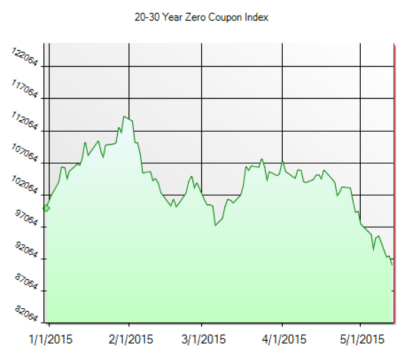Earlier this year I discussed the fairly dramatic change in my view on long-term government bonds. In essence, I said that bonds were irrationally priced given the low likelihood of deflation that the market was pricing in. Since then long bonds are one of the worst performing asset classes in the world on both a nominal and risk adjusted basis. For instance, the 20-30 year zero coupon index is down 9% year to date with a standard deviation of 36. That isn’t a bad result. It’s a nightmare for anyone with an overweight long bond position.
In the aftermath of this debacle many investors are trying to figure out what’s going on. In my view, this has been a fairly standard market overreaction. Back in January I discussed how irrational it was for the markets to be pricing in a nearly permanent state of deflation in Europe and the USA. This was, in my view, a very low probability outcome given the fact that the USA has seen sustained modest inflation, rising wage growth in the Employment Cost Index and slightly better growth in Europe.
Further, the markets were overreacting to the probability of a Grexit, falling oil prices and sustained lowflation. A negative 2 year break-even in the USA never made any sense, but investors were piling into long bonds regardless. And they got caught flat footed as the markets reversed, oil rallied and inflation expectations rose off of irrational levels. In my view, this is a great example of why it makes sense to construct portfolios using a probabilistic and forward looking approach. You can sidestep some substantial risks with a little bit of common sense thinking and macro understanding.
The result of this irrational environment has been a typically inefficient price reaction. And investors who were caught on the wrong side of this trade have experienced a very avoidable negative outcome. Perhaps most importantly I think it’s now safe to argue that the markets have normalized to what is a much more rational outcome. In other words, longer duration bonds look a lot more attractive today than they did at the beginning of the year….
Mr. Roche is the Founder and Chief Investment Officer of Discipline Funds.Discipline Funds is a low fee financial advisory firm with a focus on helping people be more disciplined with their finances.
He is also the author of Pragmatic Capitalism: What Every Investor Needs to Understand About Money and Finance, Understanding the Modern Monetary System and Understanding Modern Portfolio Construction.

